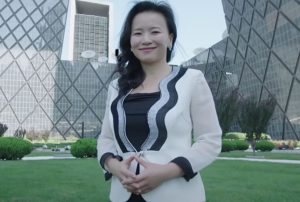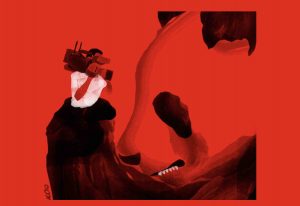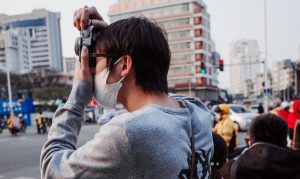In an act of harassment that is unusual even by Chinese standards, a provincial media journalist was arrested and beaten by police officers while trying to cover a gender-based violence crime in Tangshan city in northern Hebei province. shared on social media.
The press action had international repercussions, as local authorities arrested the journalist, blocked the circulation of other reporters on the grounds that they prevented the spread of covid, and launched attacks on “false media, fake reporters”. and fake news”.
While the local government did not refer to the restaurant incident, the move came after reports of police interference and blocking of journalists on social media, which has been interpreted as a broader attempt by China’s national authorities to block reporting on violent crime.
Persecuted journalist will report on developments in crime
Censorship and persecution in China are part of the daily lives of media professionals, especially foreigners and independent media.
Many were expelled from the country or denied work visas as they denounced. A report by the Foreign Correspondents Association in February.
But persecution of state media journalists such as Guizhou Radio reporter Zhang Weihan is rare.
This is mainly because he did not investigate a controversial or sensitive topic for the State such as politics and economy, but was a local crime that took place in a small town on June 10.
Chinese journalist Lu Nan told Radio Free Asia (RFA) that the authorities’ decision to accept the national campaign was most likely an attempt to stop reporting the women’s beating directly.
“They don’t want to solve problems using the rule of law, they just solve law enforcement problems illegally, directly engaging in ‘hard attack’ campaigns.
This means they want to maintain full control over public expression.”
The crime leading to the persecution
The story that led to the persecution of the Chinese journalist was captured by security cameras at a restaurant and showed the moment when a group of nine men attacked four women after one of them reacted to sexual harassment.
The footage shows a violent and brutal attack on the victims who were punched, kicked and dragged into the street by the attackers.
According to Radio Free Asia (RFA), two of the four women who were beaten are still in the hospital.
???? CHINA :#VIDEO ATTACK A WOMAN IN A RESTAURANT #TANGSHAN CAUSES CITY POLICE STICKERS
more victims of violence come to the fore.
Police stepped up their patrols against gangs and organized crime in response to the brutal attack on several women at a restaurant pic.twitter.com/vFlf3azNvG— world of love (@LoveWorld_Peopl) 13 June 2022
The leak of the gender-based violence video caused anger among the Chinese and encouraged journalists from all over the country to travel to Tangshan to examine the case.
On June 12, that’s what Zhang Weihan did, who was going to prepare a story for the “Common People Watch” program as the event came to light.
In a video shared by the journalist on social media, he said that while he was meeting people at the restaurant, police arrived, who received a call for “a man playing music and urinating there.”
The police did not approach the suspect. Instead, the police detained me and asked me to cooperate with the investigation without giving any reason.”
The officers arrested Zhang after asking for his identity and looking at messages on his cell phone, without explaining what the charge was.
The journalist said that a policeman shouted at him while he was being detained and wanted, grabbed his neck with his elbow, pushed his head to the ground and forced him to kneel.
When Zhang showed his press card, an official described him as “unskilled and ignorant”.
The journalist, who was targeted by police officials in China, said he was released after being searched for a second time hours later and left the police station without “any explanation” or documents regarding his arrest.
read it too
Boyfriend says Australian journalist arrested in China was fed raw rice and missed consular visits
Zhang also said in the video that as soon as he arrived at Tangshan Railway Station on June 11, an official told the city authorities that he had not notified the city authorities of his arrival at least 48 hours in advance and that he could not leave, citing it was necessary. covid-19 restrictions.
Following this direction, the journalist said he found an unprotected door and left the station. And he warned:
“It’s worth discussing whether this is a normal disease prevention measure or just an excuse to prevent outsiders, such as journalists, from entering the city.”
RFA and other local media reported other cases of journalists traveling to Tangshan to cover the case of assault against women and being told by the authorities not to travel around the city due to the pandemic.
Entities react to persecution of Chinese journalist
International journalistic organizations such as the Committee to Protect Journalists (CPJ) and the International Federation of Journalists (IFJ) condemned the arrest and treatment Zhang Weihan received at the police station.
“Police in Tangshan and elsewhere must allow journalists to do their job of reporting the news and informing the Chinese people about important events, including crimes,” said Steven Butler, CPJ’s Asia program coordinator in Washington DC.
Chinese reporter Zhang Weihan describes police harassment and detention in Tangshanhttps://t.co/4l1Va0oUpy
— Committee to Protect Journalists (@pressfreedom) 21 June 2022
The IFJ also spoke out against the “special campaign” supported by the Hebei provincial government against “fake news” and endorsed by government bodies.
Days after the incident at the Tangshan restaurant, along with the district attorney, internet regulator, state journalists association, and radio, film and television agency, “fake news and extortion in journalism” was interpreted as a form of persecution of journalists, according to RFA information.
“[Esses departamentos do governo] He launched a special campaign against fake news and journalistic extortion,” he said in a note posted on the state government website on June 16.
“The main mission of this campaign will be to crack down on journalistic blackmail and fake news, investigate and punish fake media, fake reporters and fake agencies, and fix ‘paid news’.”
The RFA added in the note that the action would be coordinated by a task force in the propaganda division of the provincial branch of the Communist Party of China (CCP).
“Censorship, harassment, detention, threats and harassment of journalists and media workers are frequently documented by the IJF in China,” the federation said in a statement.
“Legitimate and independent reporting should be allowed without interference or legal restrictions from the Chinese authorities.”
read it too
China’s press freedom ‘leaps back’: report shows scale of censorship and persecution
Covid-19, the argument justifying censorship and persecution
China, which has been in the center of attention of the world since the emergence of the coronavirus, has become more sensitive to its image in fighting the pandemic and has adopted the harshest restrictions against the virus.
But the use of sanitary measures as an “excuse” to censor journalists is something already observed in studies on China by international media freedom advocates.
In a report released this month, CPJ identified how the Chinese government used information to discredit its citizens, foreign journalists, and even Chinese-born journalists working for Western organizations outside the country for harassment purposes.
The committee denounced that state-related organizations in China have publicly harassed foreign journalists, resulting in mass campaigns of online and in-person harassment.
Part of this is due to the control China wants to have over the accusations it makes abroad, according to the organization.
Read more
How is China using its citizens to harass foreign journalists at home and Chinese journalists abroad?
The campaign announced by the Hebei provincial government cannot be considered as a novelty in the country.
An analysis by the Australian Strategic Policy Institute (ASPI) has revealed how a network of coordinated attacks on Twitter against journalists, particularly ethnic Chinese women working in major media outlets, works.
The prosecution’s focus has been on journalists working for major Western media outlets such as The New Yorker and The Economist, The New York Times and The Guardian, and financial news site Quartz.
The attacks on Twitter accounts of Jiayang Fan (New Yorker), Alice Su (The Economist) and Muyi Xiao (New York Times) in May can be given as an example.
Many of the posts said they were “traitors” and “damaged” China’s image, a persecution that intimidated and could suppress work, creating the effect of self-censorship.
According to the researchers, in addition to journalists, analysts, and human rights activists from China, they are also the object of “continuous, coordinated and large-scale” online persecution that spreads hatred and promotes persecution of professionals, launching a new initiative. in censorship.
Read more
source: Noticias
[author_name]


